Kia Motors Bundle
What Drives Kia Motors Forward?
Understanding a company's core principles is key to evaluating its potential. Kia Motors, a global automotive leader, has a compelling mission, vision, and set of core values that shape its strategic direction. These elements are crucial for understanding Kia's current success and future prospects.
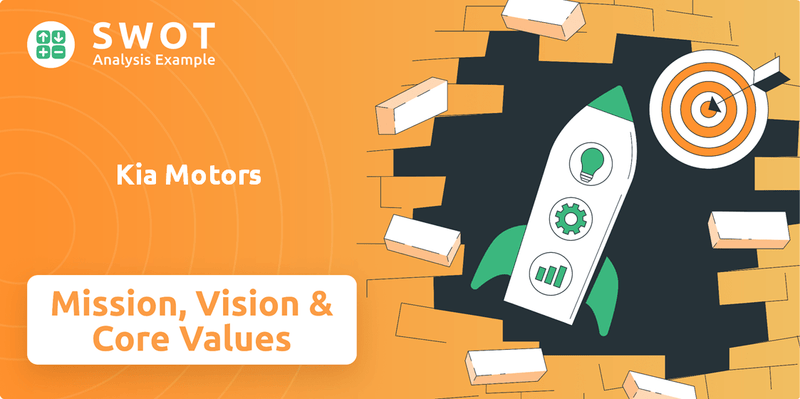
Kia's Kia Motors SWOT Analysis demonstrates how its mission, vision, and core values translate into tangible strategies and market performance. Examining Kia's mission statement, vision statement, and core values offers a deep dive into its brand philosophy and long-term goals. This analysis provides insights into how Kia aims to lead in the evolving automotive industry, especially concerning electric vehicles and sustainable practices.
Key Takeaways
- Kia's mission and vision drive its transformation into a leading sustainable mobility provider.
- 'Movement that inspires' reflects Kia's ambition to enable human progress through mobility.
- 'Plan S' strategy and strong financial performance showcase commitment to electrification and diversification.
- Core values of 'Cleaner and Circular,' 'Safe and Satisfying,' and 'Transparent and Trustworthy' differentiate Kia.
- Alignment with guiding principles strengthens Kia's market leadership and brand loyalty.
Mission: What is Kia Motors Mission Statement?
Kia's mission is encapsulated in its brand purpose, 'Movement that inspires,' aiming to provide innovative mobility solutions that enable human progress.
Let's delve into the mission of Kia Motors, exploring its core components and how they shape the company's strategic direction and impact its stakeholders.
Kia's Kia Motors Mission is not just about selling vehicles; it's about fostering a future where mobility enhances lives. This mission, expressed through 'Movement that inspires,' goes beyond traditional automotive manufacturing to encompass sustainable mobility solutions. This reflects a broader Kia Brand Philosophy focused on customer experience and societal impact.
Kia targets individuals and corporate clients seeking innovative and sustainable mobility solutions. The company's market scope is global, with a strong emphasis on expanding into new and emerging business areas, including electric vehicles (EVs) and Purpose-Built Vehicles (PBVs). This global approach is crucial for achieving its Kia Strategic Objectives.
Kia offers a diverse range of products, including passenger cars, SUVs, commercial vehicles, EVs, and PBVs, complemented by mobility services. This diversification is a key element of its mission to provide comprehensive mobility solutions. This is a key aspect of understanding Kia Company Goals.
The unique value proposition centers on inspiring movement and enabling human progress through innovative products and services. Kia aims to enhance daily lives and offer sustainable solutions. This is a key component in understanding the company's long-term vision and is thoroughly discussed in Marketing Strategy of Kia Motors.
Kia's commitment to its mission is evident in its tangible actions, such as the planned release of 11 BEVs by the end of 2025, targeting a 6.6% global EV market share (excluding China). The development of PBVs further demonstrates its diversification into mobility services. This shows how Kia Motors Vision is being implemented.
The mission is strongly customer-centric and innovation-focused, aiming to provide solutions that improve customer experiences and contribute to a more sustainable future. This approach is crucial for long-term success in the rapidly evolving automotive industry. Understanding Kia Core Values helps to understand this.
In summary, Kia's mission, 'Movement that inspires,' is a forward-looking statement that guides its strategic direction, product development, and market expansion. It reflects a commitment to innovation, sustainability, and customer satisfaction, positioning Kia as a leader in the evolving mobility landscape. This mission is supported by a clear vision and a set of core values that drive the company's operations and strategic decisions.
Kia Motors SWOT Analysis
- Complete SWOT Breakdown
- Fully Customizable
- Editable in Excel & Word
- Professional Formatting
- Investor-Ready Format
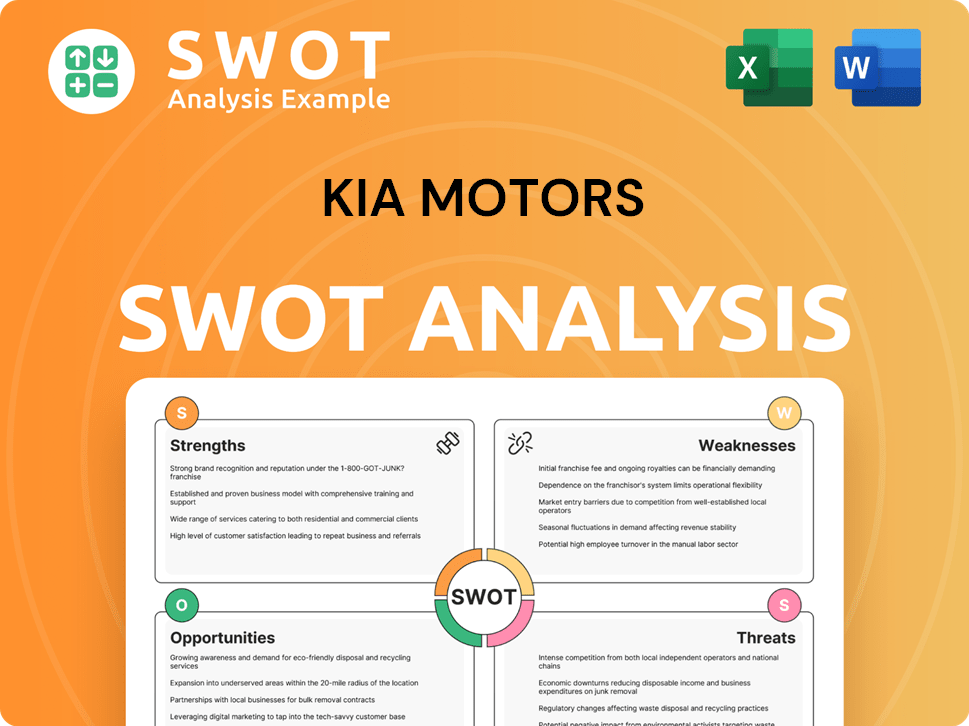
Vision: What is Kia Motors Vision Statement?
Kia's vision is 'to create sustainable mobility solutions for consumers, communities, and societies globally.'
Kia's vision is a forward-thinking declaration, emphasizing a significant transition towards an electric vehicle (EV)-focused business model and the provision of tailored mobility solutions. This ambitious vision encompasses a broad scope, aiming to disrupt the automotive industry by leading in vehicle electrification and expanding mobility services. Understanding Owners & Shareholders of Kia Motors is crucial to grasping the implications of this vision.
The vision is deeply rooted in the future, reflecting Kia's commitment to proactively transform its operations. This includes a shift towards EVs and customized mobility solutions, positioning Kia at the forefront of industry change.
Under its 'Plan S' strategy, Kia has set ambitious targets, aiming for global sales of 4.19 million units by 2030. This includes 2.33 million hybrid and fully electric vehicles (EVs), demonstrating a strong focus on sustainable mobility.
Specifically, Kia targets 1.26 million EV sales by 2030 and 250,000 Purpose-Built Vehicle (PBV) sales by the same year. These goals highlight Kia's dedication to expanding its EV offerings and entering the PBV market.
The vision appears realistic yet highly aspirational, considering Kia's current trajectory and market position. Kia’s 2024 performance with record global sales of 3.1 million units and a revenue of KRW 107.45 trillion, supports this.
Kia's consistent investment in future business, with KRW 19 trillion allocated for electrification, software-defined vehicles (SDVs), robotics, and advanced air mobility (AAM) between 2025 and 2029, shows its commitment to achieving its vision.
The introduction of new EV models like the EV3, EV4, EV5, and the upcoming EV2, alongside the PV5 for its dedicated PBV business, showcases concrete steps towards realizing this future and achieving its Kia Motors Vision.
The Kia Motors Vision is not just a statement; it is a strategic roadmap guiding the company's actions and investments. It shapes the Kia Company Goals and Kia Strategic Objectives, ensuring that every initiative aligns with the long-term goal of sustainable mobility leadership. This also reflects the Kia Brand Philosophy, which prioritizes innovation, customer satisfaction, and environmental responsibility. The focus on EVs and PBVs, combined with significant financial investments, demonstrates Kia's commitment to its vision. The company's ability to achieve record sales and revenue further supports the feasibility of its ambitious targets. Understanding the Kia's core values and principles is essential to grasp how the company intends to realize its vision. The Kia Motors Mission and vision work in tandem to guide Kia's growth and impact on the automotive industry.
Kia Motors PESTLE Analysis
- Covers All 6 PESTLE Categories
- No Research Needed – Save Hours of Work
- Built by Experts, Trusted by Consultants
- Instant Download, Ready to Use
- 100% Editable, Fully Customizable
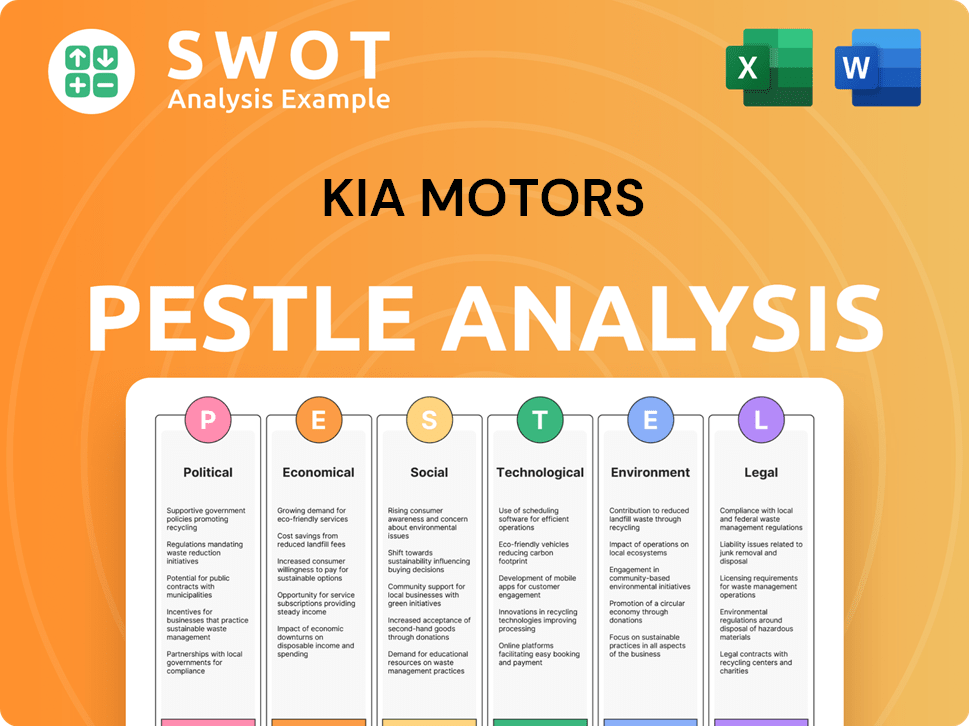
Values: What is Kia Motors Core Values Statement?
Understanding Kia's core values is crucial to grasping its identity and future direction. These values, deeply embedded in its ESG vision, guide Kia's operations and shape its impact on the world.
This core value emphasizes Kia's commitment to environmental responsibility and resource efficiency. Kia aims to minimize its environmental impact throughout the entire product lifecycle, promoting a circular economy. A key initiative is their goal to achieve carbon neutrality by 2045 and RE100 by 2040, with plans to incorporate recycled materials like marine plastic into their vehicles, such as the upcoming EV3.
Kia is dedicated to product quality, customer well-being, and stakeholder satisfaction. This involves enhancing product quality for customer safety and satisfaction, as demonstrated by its high rankings in the J.D. Power U.S. APEAL Study. Furthermore, Kia supports electrification R&D for suppliers to secure future competitiveness and fosters a customer-oriented corporate culture.
Kia is committed to ethical conduct, sound governance, and building trust with all stakeholders. This is reflected in its strengthened board accountability, with a majority of independent directors, and a focus on ethical management practices. This commitment is essential for fostering trust with customers, investors, and the wider community, ensuring the long-term success of the company.
While not explicitly stated as a core value, Kia's actions strongly suggest a focus on innovation and customer-centricity. Kia consistently introduces new technologies and features to enhance the driving experience and meet evolving customer needs. This is evident in its investment in electric vehicle technology and advanced driver-assistance systems, reflecting a commitment to staying ahead of industry trends and providing superior value to its customers.
These core values, the foundation of Kia's growth strategy, differentiate Kia in the automotive market, positioning it as a responsible and forward-thinking company. Understanding these values provides a comprehensive view of Kia's operations and its commitment to a sustainable and customer-focused future. Next, we will explore how Kia Motors Mission and Vision influence the company's strategic decisions.
How Mission & Vision Influence Kia Motors Business?
Kia Motors' mission and vision are the cornerstones of its strategic decision-making, guiding the company's actions and shaping its future. These statements provide a clear roadmap, ensuring that every initiative aligns with Kia's overarching goals and brand philosophy.
Kia's commitment to sustainable mobility, as outlined in its Kia Motors Mission, is the driving force behind its aggressive EV strategy. This commitment is evident in the company's ambitious plans for EV expansion, including the introduction of multiple new BEV models by the end of 2025.
- Kia plans to introduce 11 BEVs by the end of 2025, targeting a 6.6% global EV market share (excluding China).
- In 2024, Kia's EV sales in the US surged by 74%, representing 7% of total US sales.
- By 2030, Kia aims for 1.26 million EV sales and nearly one million hybrid sales.
- The launch of models like the EV3, EV4, EV5, and the upcoming EV2 directly reflects this strategic focus.
Reflecting its Kia Motors Vision to provide diverse mobility solutions, Kia is actively entering the PBV market. This strategic move caters to growing sectors like car-sharing and e-commerce, aligning with their mission to improve customers' daily lives through innovative services.
Kia aims to sell 250,000 PBVs by 2030, with the PV5 launching in 2025, followed by the PV7 in 2027 and PV9 in 2029.
Kia's dedication to a 'Cleaner and Circular' value, one of its Kia Core Values, is demonstrated through its commitment to carbon neutrality by 2045. This influences manufacturing practices, emphasizing recyclable materials and renewable energy.
Kia is increasing global production capacity by 17% to 4.25 million units by 2030 while focusing on eco-friendly processes.
Kia's long-term vision as a sustainable mobility solutions provider is supported by significant investments in future technologies. This financial commitment directly supports their long-term vision of becoming a sustainable mobility solutions provider.
Kia plans to invest KRW 42 trillion (approximately $29.3 billion USD) from 2025 to 2029, with KRW 19 trillion allocated to future businesses like electrification, SDVs, robotics, and Advanced Air Mobility (AAM).
The strategic decisions guided by Kia's mission and vision have resulted in strong financial performance. This profitability was higher than rivals like Tesla (10.7%), Toyota (10.4%), Mercedes-Benz (9.4%), BMW (9.0%), and Volkswagen (5.4%) in 2024.
In 2024, Kia achieved its highest annual global sales of 3.1 million units and a record annual revenue of KRW 107.45 trillion (approximately $75 billion USD), with an operating profit of KRW 12.67 trillion and an operating profit margin of 11.8%.
The Kia Brand Philosophy shapes day-to-day operations by fostering a 'customer-oriented and people-oriented' corporate culture. This ensures that the company's actions are always aligned with its core values and objectives.
Long-term planning is guided by 'Plan S,' which outlines targets for 2030 including global sales of 4.19 million units and a revenue of KRW 170 trillion.
Kia's leadership emphasizes the importance of the company's mission and vision in driving its future. This clear direction ensures that all initiatives contribute to Kia's long-term success.
As Ho Sung Song, President and CEO of Kia Corporation, stated, "At Kia, we believe that transportation, mobility, and movement represent a human right. Our vision is to create sustainable mobility solutions for consumers, communities, and societies globally. Today we start putting this vision into action with the launch of our new brand purpose and strategy for the future.”
In conclusion, Kia's mission, vision, and core values are not merely aspirational statements; they are the very foundation upon which the company builds its strategy, drives innovation, and achieves remarkable results. The alignment between these guiding principles and Kia's strategic objectives is evident in its product development, market expansion, sustainability efforts, and financial performance. To gain a deeper understanding of how Kia continues to refine these crucial elements, let's explore the next chapter: Core Improvements to Company's Mission and Vision.
Kia Motors Business Model Canvas
- Complete 9-Block Business Model Canvas
- Effortlessly Communicate Your Business Strategy
- Investor-Ready BMC Format
- 100% Editable and Customizable
- Clear and Structured Layout
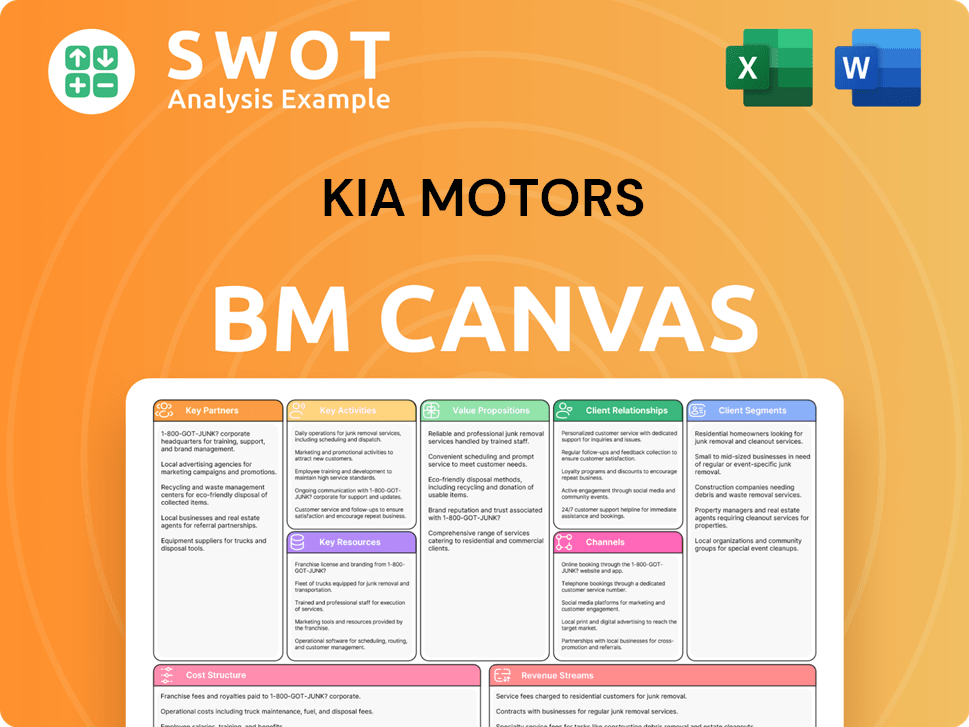
What Are Mission & Vision Improvements?
While Kia Motors' current mission, vision, and core values provide a solid foundation, strategic enhancements can further solidify its position in a rapidly evolving automotive landscape. These improvements aim to increase clarity, align with market trends, and amplify Kia's commitment to a sustainable and technologically advanced future.
To resonate more deeply with consumers and investors, Kia Motors' mission statement could explicitly integrate social impact goals. This might involve a commitment to equitable access to sustainable mobility or fostering diverse and inclusive communities, going beyond just environmental efforts. This aligns with the growing emphasis on corporate social responsibility, a trend that is increasingly influencing consumer purchasing decisions and investment strategies. For instance, a recent study by Deloitte revealed that 61% of consumers are attracted to brands with strong ethical values.
Kia's vision could be strengthened by incorporating key performance indicators (KPIs) from its 'Plan S' strategy into its public-facing statements. This would make the vision more measurable and transparent, demonstrating the company's ambition and commitment to its strategic objectives. For example, including a target market share for electric vehicles by a specific year would provide a clear benchmark for success. Kia aims for 1.26 million EV sales by 2030, and integrating this into its vision would amplify its impact.
To maintain a competitive edge, Kia should explicitly weave a commitment to a unique technological differentiator into its mission or vision. While electrification is central, the future of the automotive industry includes autonomous driving, connectivity, and artificial intelligence. This could involve a phrase like 'to redefine the driving experience through intelligent, user-centric mobility solutions,' showcasing a forward-thinking approach. This is particularly important as the automotive industry is projected to invest heavily in these areas, with global spending on automotive software expected to reach $87.3 billion by 2030.
As software becomes increasingly crucial in vehicles, Kia's mission should highlight its leadership in SDVs and the integration of digital services, reflecting its collaboration with Hyundai Motor Group's 42dot. Furthermore, strengthening circular economy commitments within the mission or vision, such as closed-loop systems for materials, can reduce waste and promote resource efficiency. This is in line with growing consumer demand for sustainable practices, with 73% of global consumers willing to change their consumption habits for environmental reasons, as reported by Nielsen.
How Does Kia Motors Implement Corporate Strategy?
Implementing a company's mission, vision, and core values is crucial for translating strategic intent into tangible results. This involves a multifaceted approach, encompassing strategic initiatives, leadership commitment, and transparent communication across all stakeholder groups.
Kia's commitment to its Kia Motors Mission and Kia Motors Vision is most evident in its 'Plan S' strategy. This plan is the cornerstone of Kia's transformation into a sustainable mobility solutions provider, with a strong focus on electric vehicles (EVs).
- Aggressive EV Roadmap: Kia aims to launch 11 battery electric vehicles (BEVs) by the end of 2025, with a goal of selling 1.26 million EVs annually by 2030. This ambitious target demonstrates Kia's dedication to its Kia Company Goals.
- New EV Models: The introduction of models like the EV3, EV4, EV5, and the upcoming EV2, along with the PV5 as the first Platform Beyond Vehicle (PBV) model, directly supports the 'Plan S' strategy. The PV5 is designed with a flexible architecture to meet diverse customer needs, reflecting Kia's vision of personalized mobility solutions.
- Financial Investment: From 2025-2029, Kia plans to invest KRW 19 trillion in future businesses, including electrification and SDVs, solidifying its commitment to its strategic objectives.
Leadership plays a vital role in reinforcing Kia's mission and vision throughout the organization. President and CEO Ho Sung Song consistently communicates Kia's new brand purpose, 'Movement that inspires,' emphasizing the company's commitment to sustainable mobility.
Kia communicates its mission and vision to all stakeholders through various channels. The annual Sustainability Report, such as the 2024 edition, explicitly outlines their ESG vision, 'Sustainable Movement for an Inspiring Future,' and details their efforts in eco-friendliness, circular economy, safety, stakeholder satisfaction, sound governance, and ethical management.
Marketing campaigns, such as 'Movement that Inspires,' directly convey Kia's brand purpose and focus on innovation. Kia also holds annual CEO Investor Days to update shareholders and analysts on its future vision and financial targets, reinforcing its strategic direction.
The change in the corporate name from 'Kia Motors' to 'Kia' symbolizes the company's ambition to move beyond traditional automobiles. This rebranding highlights Kia's dedication to its Kia Brand Philosophy and establishing itself as a leader in future mobility.
Kia's core values are demonstrated through tangible actions and programs. These initiatives showcase how Kia aligns its actions with its stated values, building trust and credibility with stakeholders.
- Eco-friendliness (Cleaner and Circular): Kia's partnership with Ocean Cleanup to recycle marine plastic waste into vehicle accessories for the EV3, and its efforts to achieve carbon neutrality by 2045 and RE100 by 2040 through solar power generation and renewable energy agreements.
- Customer Satisfaction (Safe and Satisfying): The consistently high rankings of Kia vehicles in quality and performance studies, such as the J.D. Power U.S. APEAL Study where seven Kia vehicles ranked first in their classes.
- Ethical Management (Transparent and Trustworthy): The strengthening of board accountability with a majority of independent directors and a focus on ethical management practices throughout the supply chain.
Kia employs formal programs and systems to ensure alignment with its mission and vision. These structured approaches provide a framework for embedding values and achieving strategic goals.
- 'Plan S' as a System: The 'Plan S' strategy itself is a comprehensive system with detailed targets and investment plans, including KRW 19 trillion allocated for future businesses like electrification and SDVs from 2025-2029.
- Internal Culture Initiatives: Kia's internal corporate culture initiatives, aiming to foster a 'customer-oriented and people-oriented' environment, are crucial for embedding these values at all levels of the organization.
By focusing on these implementation strategies, Kia Motors demonstrates a commitment to its mission, vision, and core values, positioning itself for success in the rapidly evolving automotive industry. Understanding Kia's target market also plays a crucial role in its strategic implementation, as discussed in Target Market of Kia Motors.
Kia Motors Porter's Five Forces Analysis
- Covers All 5 Competitive Forces in Detail
- Structured for Consultants, Students, and Founders
- 100% Editable in Microsoft Word & Excel
- Instant Digital Download – Use Immediately
- Compatible with Mac & PC – Fully Unlocked
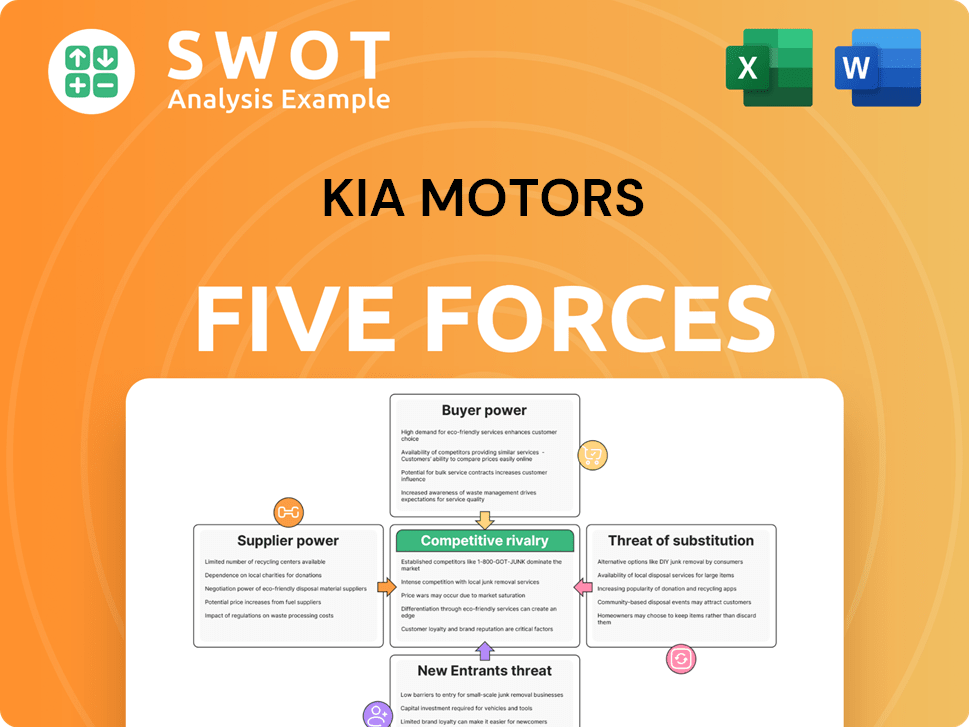
Related Blogs
- What are Mission Vision & Core Values of Kia Motors Company?
- What is Competitive Landscape of Kia Motors Company?
- What is Growth Strategy and Future Prospects of Kia Motors Company?
- How Does Kia Motors Company Work?
- What is Sales and Marketing Strategy of Kia Motors Company?
- Who Owns Kia Motors Company?
- What is Customer Demographics and Target Market of Kia Motors Company?
Disclaimer
All information, articles, and product details provided on this website are for general informational and educational purposes only. We do not claim any ownership over, nor do we intend to infringe upon, any trademarks, copyrights, logos, brand names, or other intellectual property mentioned or depicted on this site. Such intellectual property remains the property of its respective owners, and any references here are made solely for identification or informational purposes, without implying any affiliation, endorsement, or partnership.
We make no representations or warranties, express or implied, regarding the accuracy, completeness, or suitability of any content or products presented. Nothing on this website should be construed as legal, tax, investment, financial, medical, or other professional advice. In addition, no part of this site—including articles or product references—constitutes a solicitation, recommendation, endorsement, advertisement, or offer to buy or sell any securities, franchises, or other financial instruments, particularly in jurisdictions where such activity would be unlawful.
All content is of a general nature and may not address the specific circumstances of any individual or entity. It is not a substitute for professional advice or services. Any actions you take based on the information provided here are strictly at your own risk. You accept full responsibility for any decisions or outcomes arising from your use of this website and agree to release us from any liability in connection with your use of, or reliance upon, the content or products found herein.